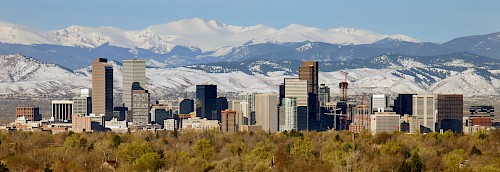How quickly the world changed in 2020. But many major U.S. markets have picked back up and a home-buying frenzy has ensued. Case Study: Denver
How quickly the world changed. Residential real estate has been burning red-hot in major markets across the US for nearly a decade. At the start of March, the real estate spring market was showing signs of being one of the best on record – but that changed by the end of the month when the nation and world felt the effects stemming from Covid-19.
Resilient as ever, many major markets picked right back up and a home-buying frenzy ensued.
Take Denver as a case study. A record number of homes on the market went under contract in June, home prices are on the rise, mortgage rates are a record low and the market is experiencing near record-low housing inventory. These factors and more are making for a strong seller’s market. Other factors for Denver’s rebound is that many homebuyers from other major markets across the nation are relocating here, whether for the lifestyle, cost of living or the job market. Companies based in Denver continue to move talent in and out, and new company headquarters are showing up all the time.
 According to numbers from the Denver Metro Association of REALTORS® (DMAR), in June, a record number of homes, 7,676, shifted into a pending sale status, up 16 percent month over month and 27 percent year over year. Additionally, weekly home closings were back above 2019 levels, ending 11-weeks of a COVID-19 induced housing slump. It seems consumers turned from stocking up on personal necessities to buying houses with the same level of frenzy. And prices are back on the rise as a result of this demand.
According to numbers from the Denver Metro Association of REALTORS® (DMAR), in June, a record number of homes, 7,676, shifted into a pending sale status, up 16 percent month over month and 27 percent year over year. Additionally, weekly home closings were back above 2019 levels, ending 11-weeks of a COVID-19 induced housing slump. It seems consumers turned from stocking up on personal necessities to buying houses with the same level of frenzy. And prices are back on the rise as a result of this demand.
In March, pre-Covid-19, the average price for a residential property in metro Denver zoomed above $500,000 for the first time, to $513,535. That price then dipped back down below the half-million-dollar mark during the home-showing shutdown and uncertain economic times in April and May. In June, however, average prices bounced back up to $509,736, the second-highest average price for residential real estate in Denver.
During that month, 7,364 homes were put up for sale, but demand was even higher. More homes were put under contract than came on the market for sale in the Denver area. And since there was not a lot of housing inventory at the end of May, the market was left with even less inventory at the end of June, down 11% month over month and 33% year over year. In fact, June had 6,383 listings at month’s end, which was nearing the record-low number for that month at 6,197 in June 2015. Less inventory means home sellers had more power. The only segment of the market in which homebuyers had the edge were condos priced over $1 million.
With masks, gloves and limited home showing time slots, real estate agents managed to write a record number of accepted contracts and closed 57% more homes in June compared to the month prior without doing traditional open houses.
At the end of June, the eighth amendment to Colorado’s public health order loosened the rules for open houses - but it isn’t going to be easy. Under the new rules, gloves, masks, a social distancing calculator, log sheet and an Occupational Safety and Health Administration approved ventilation system are just some of the items required to host an open house. Once real estate agents review all of the new rules, they may decide to continue virtual showings.
 Following the stay-at-home executive order by Colorado Governor Jared Polis on March 26, ‘real estate’ was classified as a critical business and thus real estate continued to conduct business for homebuyers and sellers in need. However, how real estate was transacted looked very different and it still does today. For some time, like most markets across the nation, Colorado no longer allowed open houses in the traditional sense, driving with clients or even riding in the same elevator. Transactions were being completed at no-contact, curbside closings with closers wearing gloves and masks. There was a new contract, called the COVID-19 Addendum, that allows a transaction to be extended in the case a homebuyer or seller is exposed or quarantined, as well as new CDC regulations to follow when listing and showing homes.
Following the stay-at-home executive order by Colorado Governor Jared Polis on March 26, ‘real estate’ was classified as a critical business and thus real estate continued to conduct business for homebuyers and sellers in need. However, how real estate was transacted looked very different and it still does today. For some time, like most markets across the nation, Colorado no longer allowed open houses in the traditional sense, driving with clients or even riding in the same elevator. Transactions were being completed at no-contact, curbside closings with closers wearing gloves and masks. There was a new contract, called the COVID-19 Addendum, that allows a transaction to be extended in the case a homebuyer or seller is exposed or quarantined, as well as new CDC regulations to follow when listing and showing homes.
Virtual tours, videos and FaceTime walk-throughs have become the preferred form of marketing for Realtors and their clients across the country. Now, homebuyers don’t have to enter properties unless they truly think it might be the one they want to buy; so we are dealing more with serious buyers ready to make firm decisions.
Realtors adapted in every community in the US and some now prefer virtual open houses, and they have been effective. In fact, a real estate agent that that has been in the business for four decades just closed on a double-ended deal solely stemming from a streaming Facebook Live open house he conducted.
The new virtual and digital tools to conduct real estate are here to stay, even when the pandemic is in our rearview mirror. While Covid-19 completely changed how real estate is transacted, it is not stopping the essential service of buying and selling a home.

About the author: Jason Exley, PHR, GMS, GDS is Director of Relocation at Kentwood Real Estate based in Denver, Colorado. Jason has nearly 25 years of experience managing both corporate global mobility functions as well as for third party relocation management companies. He holds a Professional Human Resources certification and has traveled and worked in more than 30 countries on five continents.
Kentwood is a valued Bristol partner for real estate services. Contact Jason: 720-440-4055; jexley@Kentwood.com
Tags: